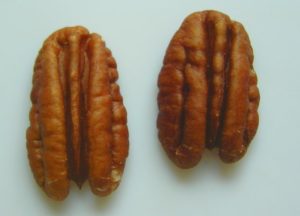
Over the years many studies have found that eating nuts is good for health and good for the gut microbiome. Now, a study that looked at the effect of adding pecans to the daily diet can be added to the list.
The Univ. of Georgia researchers found that adding about 1/4 cup (68 grams) pecans to the daily diet for 8 weeks improved cholesterol levels. A conclusion is that pecans can be viewed as good for the heart or "cardioprotective".
In the study they randomly assigned 52 adults who were at risk for heart disease (they were overweight or had hypercholesterolemia) to 1 of 3 groups, including a control group with no pecan intake. As one of the researchers (Dr. Cooper) said: "We had some people who actually went from having high cholesterol at the start of the study to no longer being in that category after the intervention.
After 8 weeks of eating 1/4 cup pecans daily, there were lower levels of fasting total cholesterol, LDL cholesterol, triglycerides, TC/HDL cholesterol ratio, non-HDL cholesterol, and apolipoprotein B in the blood There were no changes in the control (no pecan) group.
By the way, do you remember years ago when doctors cautioned people about eating nuts? That they were very high calorie and should be avoided? Hah! ... The view nowadays: Pecans are high in healthy fatty acids and fiber, both of which are linked to lower cholesterol. Eating nuts frequently also reduces the risk of several chronic diseases, including heart disease, type 2 diabetes, some cancers, and are beneficial for cognitive health.
From Science Daily: Pecan-enriched diet shown to reduce cholesterol
While the proper pronunciation of pecan remains a subject of debate, University of Georgia researchers have shown the tree nut can dramatically improve a person's cholesterol levels.
Participants at risk for cardiovascular disease who ate pecans during an eight-week intervention showed significant improvements in total cholesterol, triglycerides and low-density lipoprotein (LDL), or "bad" cholesterol, in a study conducted by researchers in the UGA College of Family and Consumer Sciences.
Researchers saw an average drop of 5% in total cholesterol and between 6% and 9% in LDL among participants who consumed pecans.
For context, researchers referred to a previous meta-analysis of 51 exercise interventions designed to lower cholesterol that reported an average reduction of 1% in total cholesterol and 5% in LDL cholesterol. "The addition of pecans to the diet not only produced a greater and more consistent reduction in total cholesterol and LDL compared to many other lifestyle interventions, but may also be a more sustainable approach for long-term health," Cooper said. "Some research shows that even a 1% reduction in LDL is associated with a small reduction of coronary artery disease risk, so these reductions are definitely clinically meaningful."
Researchers assigned 52 adults between the ages of 30 and 75 who were at higher risk for cardiovascular disease to one of three groups. One group consumed 68 grams or about 470 calories of pecans a day as part of their regular diet; a second group substituted pecans for a similar amount of calories from their habitual diet, and a control group did not consume pecans.
At eight weeks, participants consumed a high-fat meal to determine changes in blood lipids and the amount of glucose, or sugar, in the blood.
Fasted blood lipids showed similar improvements among the two pecan groups while post-meal triglycerides were reduced in the group that added pecans. Post-meal glucose was lowered in the group that substituted pecans.
"Whether people added them or substituted other foods in the diet for them, we still saw improvements and pretty similar responses in total cholesterol and LDL cholesterol in particular," said Cooper, who also serves as director of the UGA Obesity Initiative.
